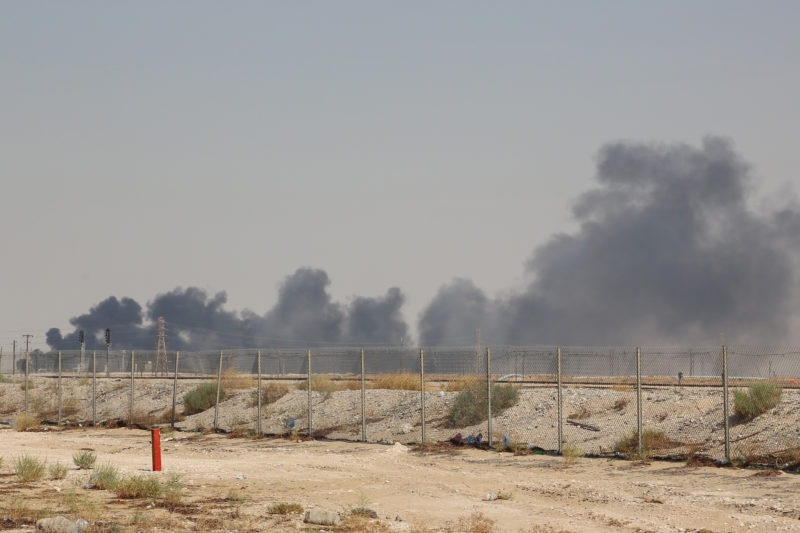Yemeni rebel attacks pose danger to Saudi infrastructure
Smoke billows from the Aramco oil facility in Abqaiq on September 14 (-)
Riyadh (AFP) – Drone attacks launched by Yemeni rebels on Saudi oil facilities on Saturday have exposed the threat to critical infrastructure in the kingdom.
Saudi facilities are increasingly vulnerable to the steadily advancing weaponry of the Iran-allied Huthi rebels — from ballistic missiles to unmanned drones.
Here is a list of the key Saudi infrastructure potentially exposed to attacks:
Oil facilities
Saudi oil giant Aramco, the world’s biggest energy company, operates Ghawar and Safaniyah, two of its biggest oil fields.
While its oil wells, scattered over a vast geographical area, may be a difficult target, its various oil processing facilities are vulnerable to potential rebel strikes.
The Abqaiq facility –- one of the two sites targeted on Saturday –- is the “most vulnerable” among them, the Washington-based Center for Strategic and International Studies (CSIS) said in a report.
The Abqaiq plant is Aramco’s largest oil processing facility and crude oil stabilisation plant, with a capacity of more than seven million barrels per day, according to the company.
Aramco’s vast system of pipelines, pumping stations and its ports along the Persian Gulf and Red Sea are also vulnerable to potential attacks.
Huthi rebel drones targeted two oil pumping stations on Saudi Arabia’s key east-west pipeline in May, shutting it down for several days.
The oil infrastructure is also vulnerable to cyber attacks.
In 2012, Aramco was among the firms hit by Shamoon, an aggressive disc-wiping malware, in what is believed to be the country’s worst cyber attack yet.
Desalination plants
Desalination plants provide more than 70 percent of the kingdom’s drinking water, according to official figures.
Ras al-Khair, the world’s largest desalination plant located on the kingdom’s Persian Gulf coast, looks vulnerable.
The kingdom’s water supply could be severely affected in the event of a major attack on the plant.
“Cyber attacks also present a serious threat to Saudi desalination plants like Ras al-Khair,” the CSIS report said.
Electrical grid
Saudi Arabia’s electrical grid has struggled to keep pace with the demands of its rising population and industrial infrastructure.
An attack on the oil and gas sector could severely impact the electrical grid as the kingdom is largely dependent on hydrocarbons as fuel for the electricity sector.
Its network of transformers and substations are vulnerable to explosive attacks, the CSIS report said.
The electrical system can also be disrupted by cyber attacks, it added.
Disclaimer: Validity of the above story is for 7 Days from original date of publishing. Source: AFP.


